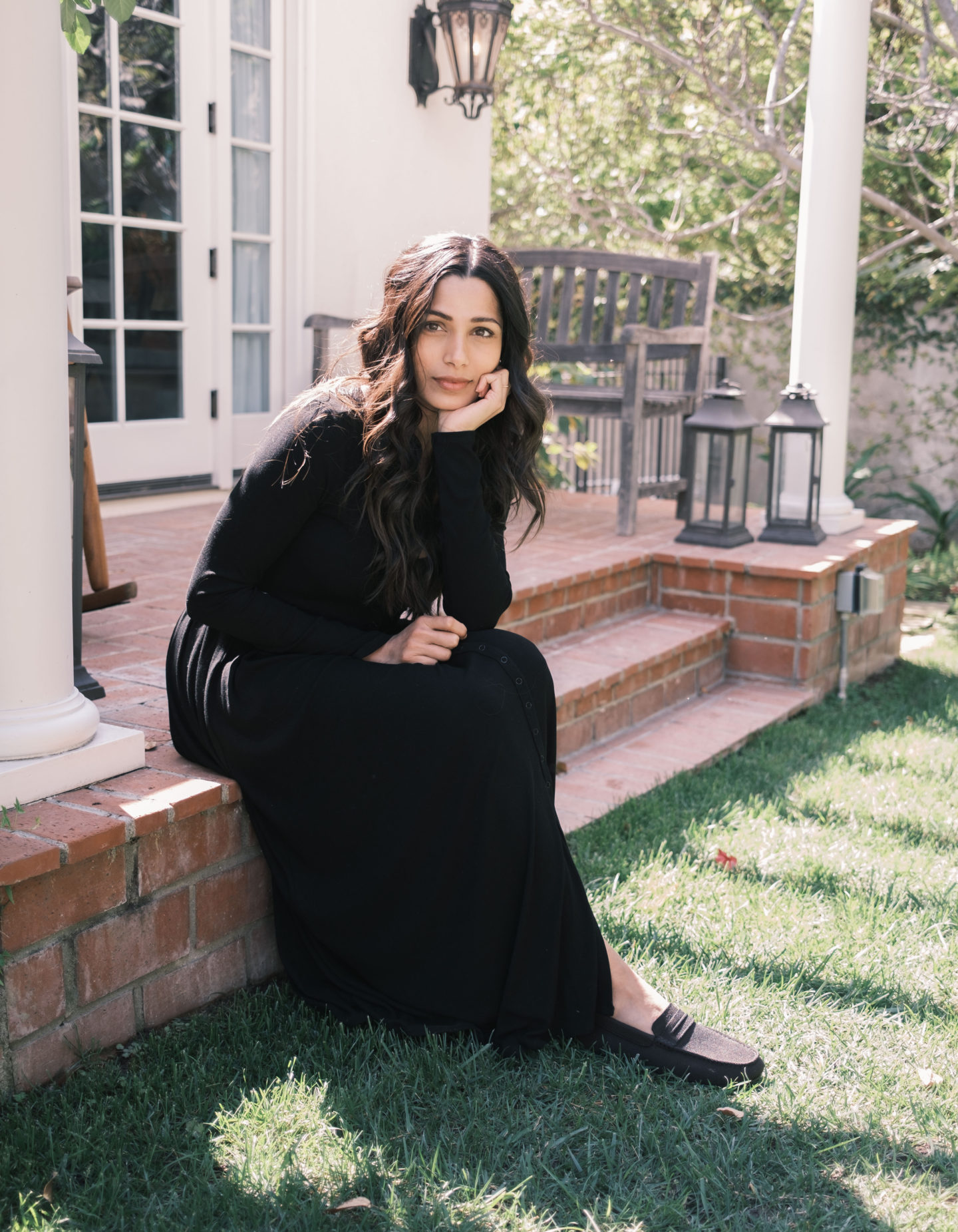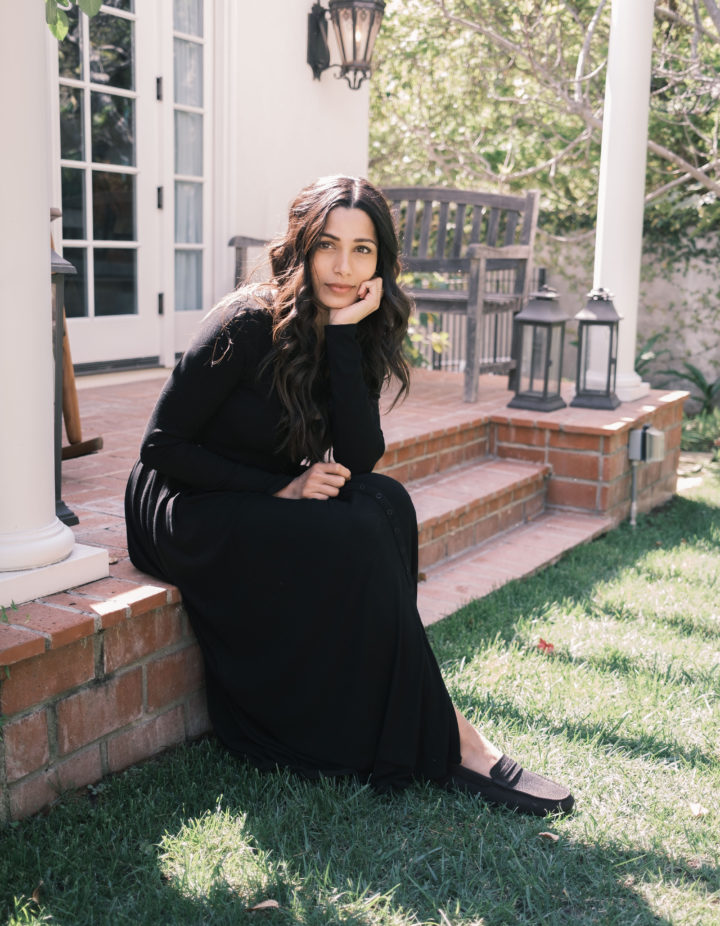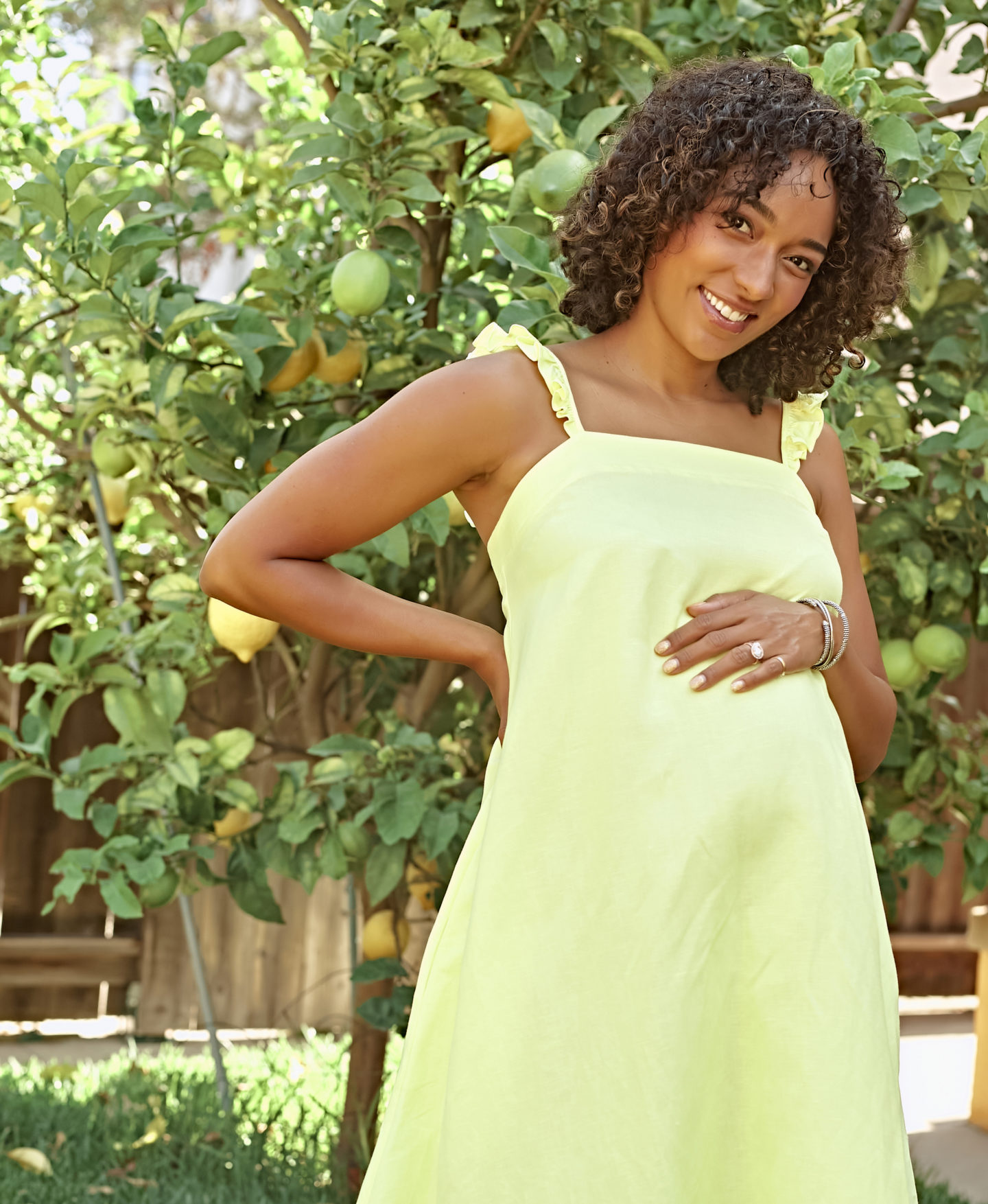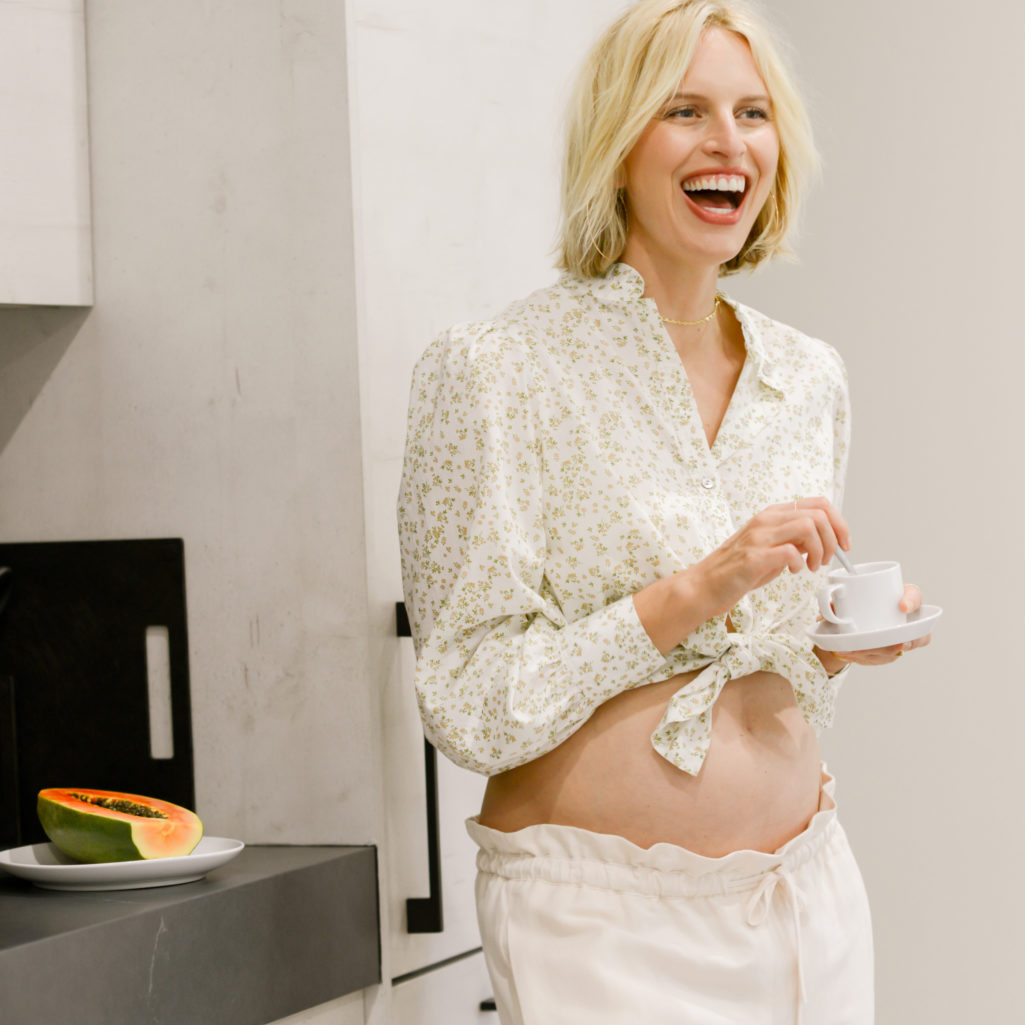The actress, film producer, and chief impact officer at Anya is on the postpartum journey after having her first child, son Rumi-Ray last November. And it’s a journey she planned for….thoroughly. From devouring postpartum books to preparing her new mother sanctuary, you could say Freida placed more importance on the months following her birth than during the pregnancy, itself.
We stole some time with Freida to discuss how it’s all going, why the postpartum period is so crucial for mama and baby, and the ways her Indian heritage has inspired her self-care during pregnancy and beyond.
How is your postpartum journey going? Highs? Lows? Is it what you expected or a total surprise?
It’s all kinds of ups and downs, challenges and rewards. I’m learning to do and unlearning to do a lot in this new phase as a mother. I don’t know any experience like this in the world, so I can’t compare it. Therefore, there’s nothing I could have expected. Everyday is a new day. It did start off as not knowing anything and listening to all the cooks in the kitchen and then allowing myself to tap into my instincts. And hearing other moms discuss the challenges they faced. The key thing I’ve heard is that you get more relaxed with your second or third baby, so I wanted to bring that relaxation into my first experience.
After the first month of uncertainty, my second month felt more relaxing. Then the third month presented new challenges, because suddenly I felt this American style of competition that you had to be ahead of the game – that earlier is better when it came to certain milestones like napping and sleeping. That corrupted my brain for a split second. But it’s all bullshit anyway. Every baby is different, so I listen to what my baby wants. Nothing works for every baby across the board, which is a huge disservice to all first-time parents.
After that fear took over, it paralyzed me for a few weeks and I had to stop and tap into my anxiety. I realized it was seeping into his life as well and making him anxious. Now, I’ve totally given up on sleep training and we’re both sleeping better. I’ve stopped stressing and it’s been a huge relief for me.
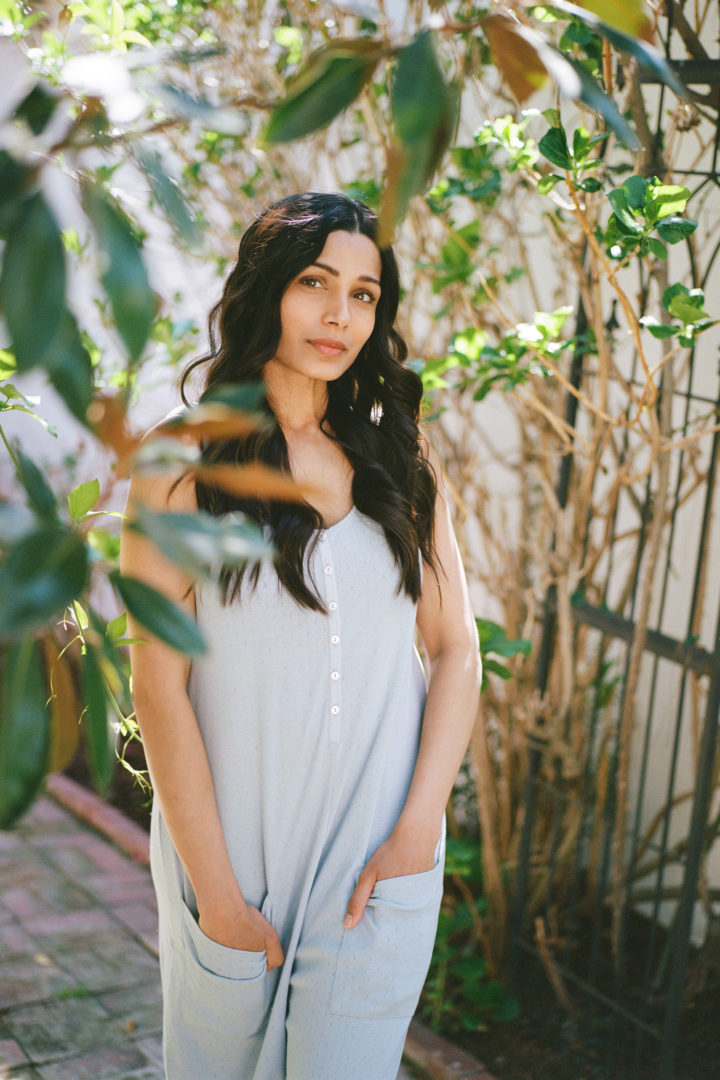
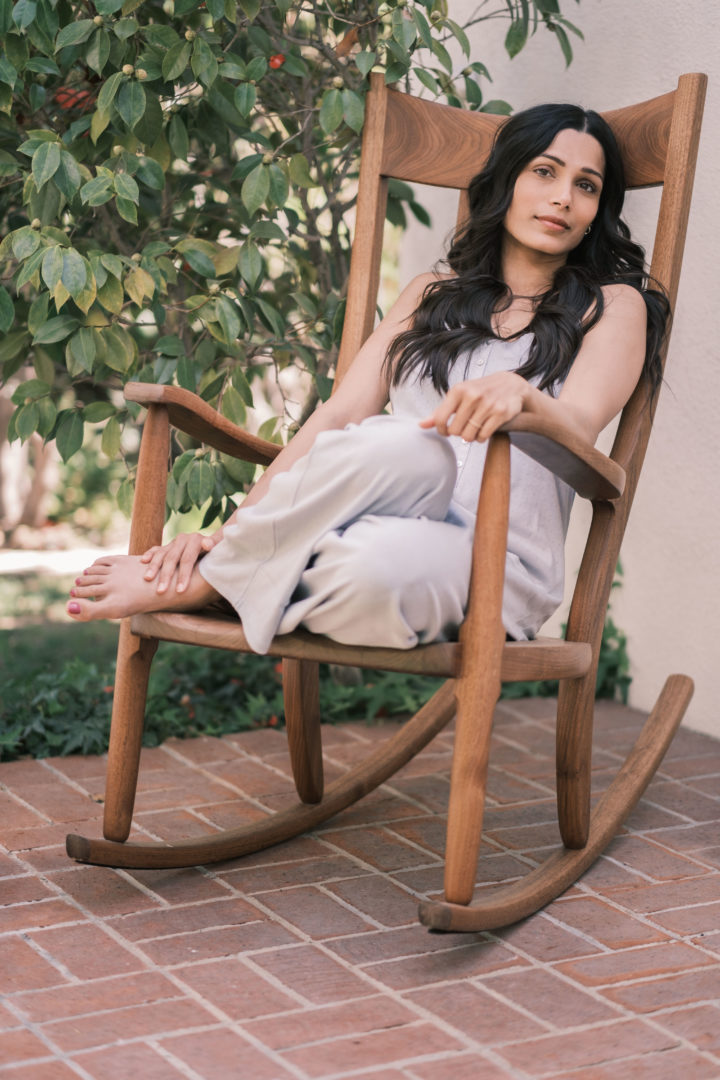
How was your son’s birth? Did it go “as planned?” or were there some surprises there as well?
It was beautiful. I was well aware after a very traumatic experience in my life that postpartum is a journey and something we’re ill prepared for. I learned that early on when I got pregnant with Rumi. I put all the pregnancy books aside and jumped into the 4th trimester and I decided I was going to gear myself up for the year after birth more than stressing about the pregnancy itself. It’s great to know about the body and be in the loop but most of that gets taken care of at the doctor. But then during postpartum, those appointments fall away. You get one appointment at the six week mark. Even then, it’s too late and there’s no information then. So I decided to buck the trend of learning about the trimesters in this linear way and did a deep dive into birth and postpartum. The two books I felt completely immersed with were Kimberly Ann Johnson’s The Fourth Trimester and Ina May’s Guide to Childbirth by Ina May Gaskin.
I also leaned into my Indian traditions of how a mother is taken care of post birth and I really prepped my postpartum sanctuary by how I wanted to be nurtured. So going into birth, which was 10 days before my due date, I wasn’t ready with a hospital bag but I knew to keep my calm throughout it all. I opted for an unmedicated birth, so I knew I had to be prepared for anything. I walked into birth feeling excited. I almost had this sense of euphoria. I was excited to know what labor feels like. I was hoping to transform the word “pain” and change it to “gateway.” Everytime I had a contraction, it was a gateway, an opening. I was one step closer to meeting my son.
I was also very active right before my due date. I took care of my body nutritionally as well. By the time Rumi came, I had a body and mind that supported me through it. Nothing is more beautiful than the preparation of the mind.
How would you describe the difference between the postpartum experience in the US versus India?
It’s night and day. It’s so much more understood and respected in India than here. Over here it feels like a phase. Over there it’s truly an experience that mothers need to be nurtured during this time, not just about the newborn and baby. In India, if the mom isn’t nurtured, the baby isn’t nurtured. Also, in India, the first 30 to 40 days the mother has her maternal mom move in with her or she’ll get some kind of help, like daily massage or her food is cooked. She’s not allowed to get out of bed. I mean, your entire body had to transform to push a baby out. The healing won’t happen overnight. Even 40 days isn’t enough. Emotions are high, hormones are plummeting.
Breastfeeding is an added hill to climb. I had insane latch issues. I had bleeding nipples, constant spasms in my breast tissue. It was not easy. Ancient traditions of India really allows the mother sacred time to rest and recover and re-energize. And so for a mom to go back to work and do work that is a mental and physical load, it’s so unfair and wrong and can have long term repercussions as well. The sanctity of postpartum is not understood in this country. But really the issue is systemic. If the children are the future, nurturing mothers should be our present.

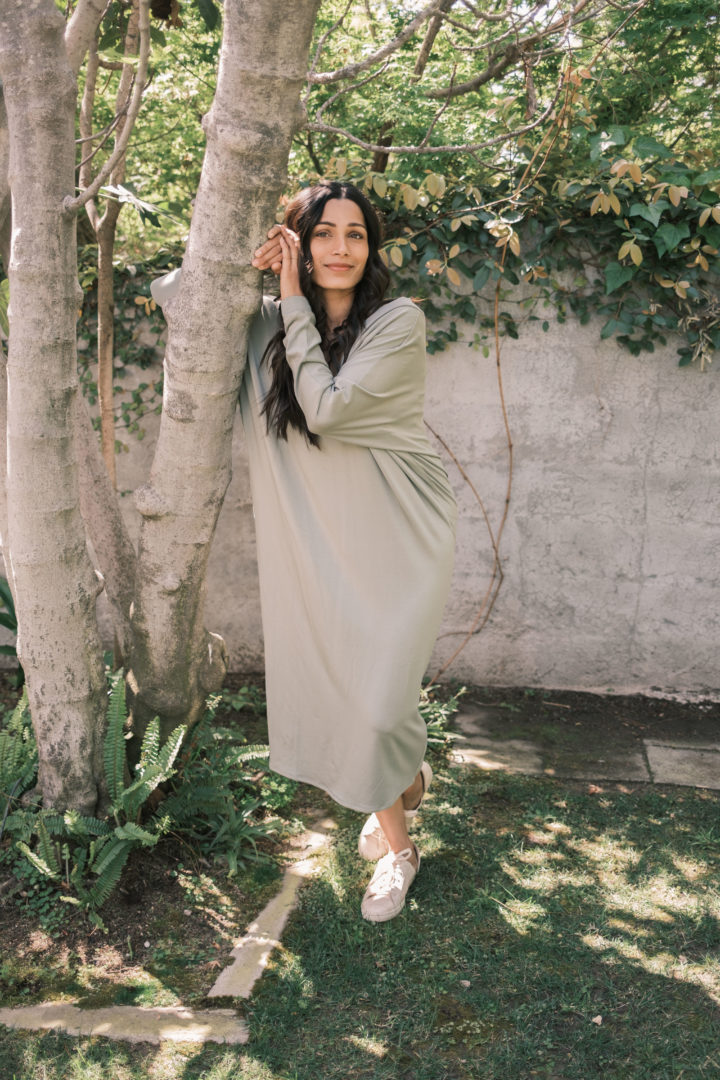
How have you been juggling motherhood and your career plus advocacy work? Any advice or learnings so far?
I haven’t returned to a film set, and I do not want to return to a film set or tv show until I’ve completed four months postpartum. I am working on my production company, which I’m doing from home – which is a lucky thing to do. When I came back into the workforce, I had poor focus. I couldn’t read without falling asleep, I was constantly distracted. I was freaking out at 12 weeks and kind of losing a bit of my life at that point. I spoke to my producing partner, Emily and she talked me off a ledge. She said, let’s put all of your stresses in backpacks. There’s the Rumi backpack, the caring for you backpack, the caring for everyone else backpack. Which one can you take off your shoulders?
What are some of the lifestyle, self-care routines that have helped you through the postpartum phase?
I really enjoyed incorporating Ayurvedic traditions, which was the root of my healing journey as well. In general I turned to more natural ways of self-care and healing. Ayurveda speaks strongly to me. I did Abhyanga massages with medicated oil. When your postpartum, one thing you have in excess is vata – an airy, windy feeling in the body. It’s linked to feeling depressed and low and poor digestion. Oil massages are important to have for a sense of peace. And it’s not a spa. You can get the oil from a trusted source and do it at home with self massages or long stroke massages. Someone can do it for you.
I also ate certain healing foods my mother prepared for me that are typical of South Indian culture. During the first three days postpartum she’d make me a special drink with black pepper called kalijeera mixed with ginger. It helps eliminate any more toxins might be present in the uterus, and helps with constipation. We all know how scary that first BM is.
In the Western culture, everyone brags about that first meal after they give birth. In Indian culture, you’re only allowed extremely beautiful, warming meals – soups and broths and rice congee with good fats in it and homemade ghee. For me I did not have to fear constipation because my mother wasn’t going to allow me to eat junk food. So it’s food, massages lactation balls, etc.
I also added an hour everyday of just me time. No baby, no phone, no husband or mother. Just me and my cup of tea. I love the Anya calming tea. So I’d just sit with a cup of tea staring out the window and not plan the day or think about what I’m going to buy for Rumi. I did it for the first month. It was really healing to sit with my thoughts and process what had happened.
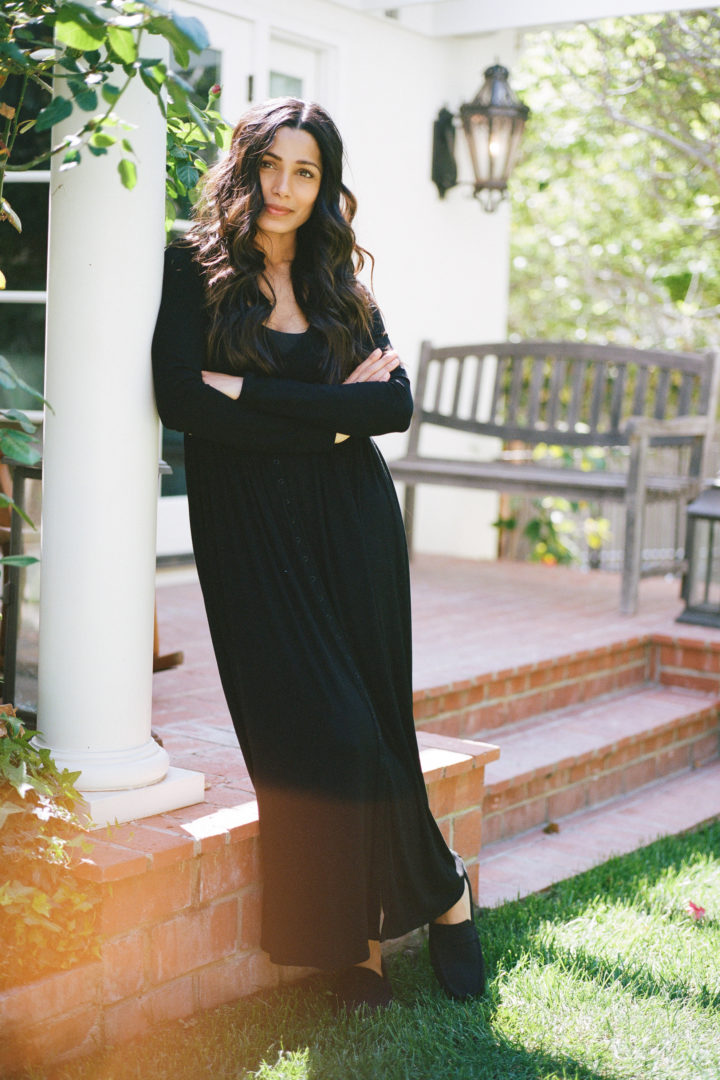
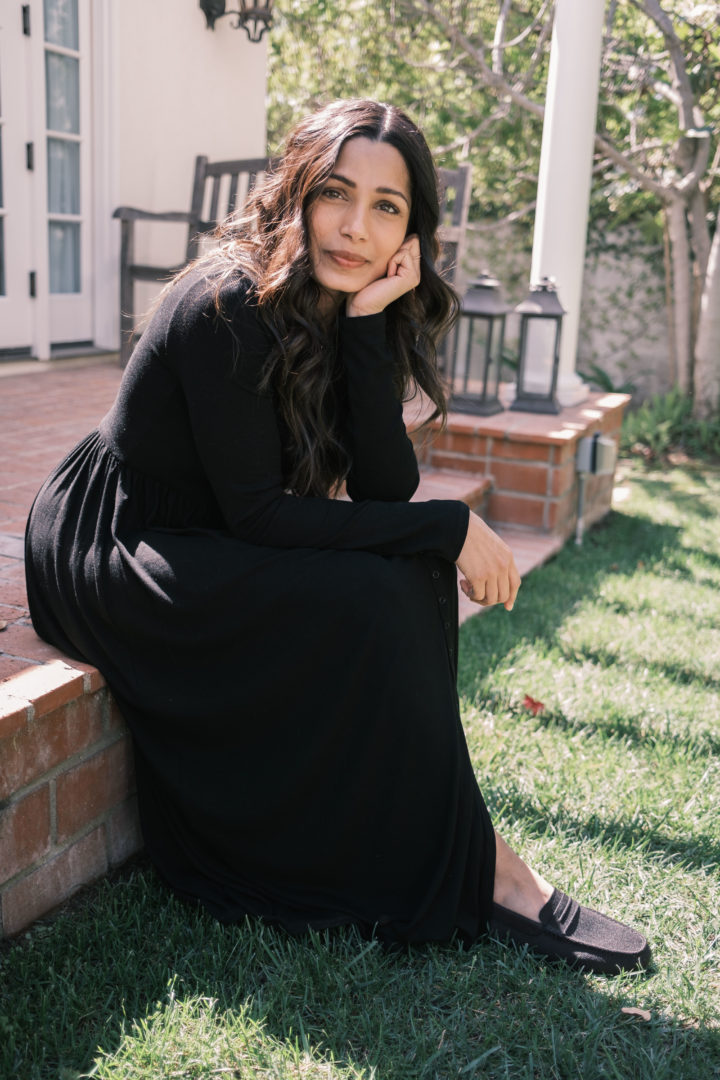
Can you tell us about your work with Anya? What is it about the postpartum experience that left you wanting more or feeling like not enough adequate support is offered for new moms?
It started when I was planning my own pregnancy, which took me a while due to having endometriosis and getting off the pill. I was depleted nutritionally and had to encourage my body to get to my place of health to carry a baby. So that journey had already set my mind going on how little we are prepared for when it comes to the body and hormones. So when Anya came along, everything was aligned. It felt super organic and I was so excited they wanted me to be a part of it.
So many women in the United States and across the world are deprived of the joy of enjoying the postpartum journey. It feels more like suffering or a hill to climb, and one you must climb fast because you have to get back to work. Easing that journey is my calling. I’m a first time mom at 37 years-old who wants to see a better world for mothers across the world. I also love experimenting with Anya’s products. I love the mission of how they’re trying to take care of moms without overwhelming them. It’s streamlined and made easy and simple and divided into first the month, second, third month – so you get what you really need instead of it all overwhelming you.
What would you all women to know about the postpartum experience?
I think there’s so much out there. I prepared so hard for the 4th trimester and felt so armed for success. My advice would be to take a break from focusing on just pregnancy. The pregnancy will be great, especially since we naturally tend to be careful during pregnancy. So my advice to expecting moms is to take time out to think about postpartum. Take a moment to speak to other moms on the journey or read a book. It really poses certain questions to yourself and gives you time to answer them, and for your partner as well.
And if you’re a first time mom who didn’t prep for postpartum, I’d say identify what areas you need the most help in and instead of googling, find the professional. If it’s breastfeeding, find the lactation consultant. If you’re having intense mood swings, start therapy. It’s that kind of work that’s so valuable throughout the postpartum journey.
